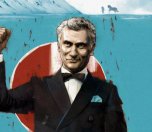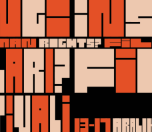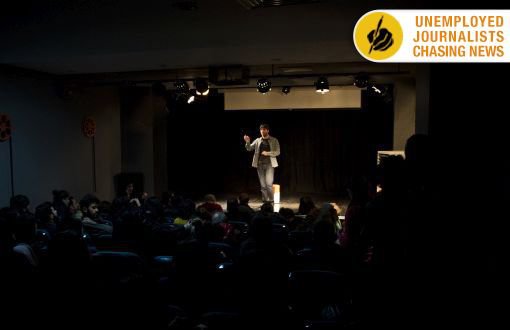Click to read the article in Turkish and Kurdish
Turkey makes it to top 10 in the annual report on censorship, attacks and violation of rights towards art and artists published by Freemuse, a Denmark-based freedom of speech organization.
The report underlined that the main oppression has been happening under the state of emergency. It stated that 23 serious incidents of violation of freedom of speech have taken place, 11 artists were jailed, three artists and artworks were attacked and two artists were threatened.
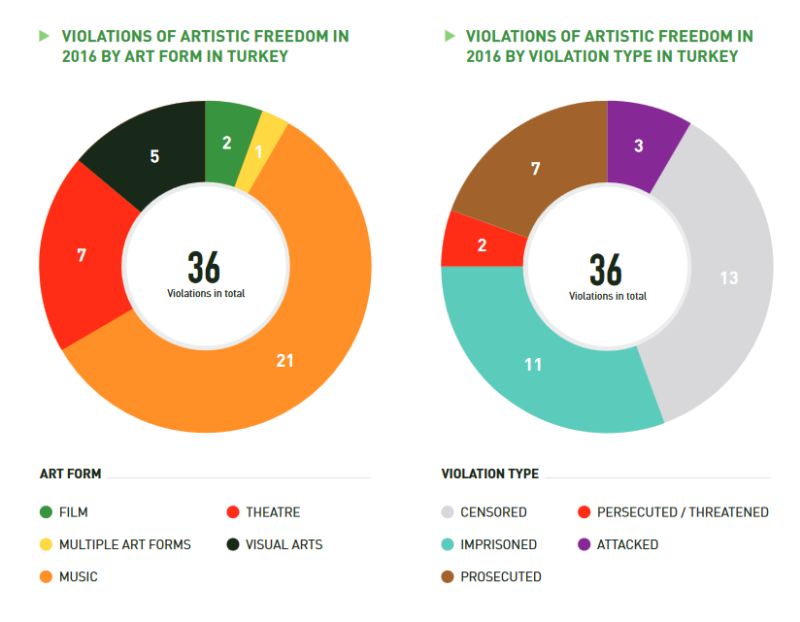
According to the report, 13 of the violations against art and artists were censorship, 11 of them were imprisonment, seven of them were investigations and two of them were threats.
The report states that Kurdish cities were affected the most by the state of emergency and that this has hindered artistic production.
What paved the way to trustees? Following the state of emergency declared on July 21, 2016, with the Statutory Decree No. 674 issued on September 1, 2016, it was enabled to delegate municipalities elected by popular vote to central government by way of appointing trustees. [1] [2] When the first appointments took place on September 11, 2016, 24 of 28 trustees were appointed to DBP (Democratic Regions Party) municipalities. With the latest appointment of trustee Kürşad Atak, the district governor, to Eğil Municipality, the number of DBP municipalities trustees appointed reached 84 (10 cities, 644 provinces and 9 boroughs). While the appointments continue, Turan Bedirhanoğlu, deputy governor of Şırnak is a trustee to three municipalities. He was appointed as trustee to Şırnak, Kumçatı and Balveren municipalities. As of April 2017, the number of arrested co-mayors from DPP is 83. |
Artistic production was stopped through trustees and statutory decrees
The main handicap affecting artistic production has been the trustees appointed to municipalities.
Culture and art centers in many cities became unable to produce art due to the practices of the trustees. Many artists’ contracts were cancelled.
No official data: 14 government agencies refused to answer
It is almost impossible to find official data regarding the developments taking place in the arts and culture scene of the region.
In this research, within the scope of which we examined 14 city centers and provinces where trustees were appointed to (Central Diyarbakır, Silvan, Central Mardin, Nusaybin, Kızıltepe, Dargeçit, Mazıdağı, Central Batman, Central Şırnak, Cizre, Silopi, İdil, Central Hakkari, Yüksekova), no government agencies, which we applied within the scope of the right to information, answered our questions.
In fact, the municipalities’ approach to the right to information is visible on their websites. The information links on some of the municipalities’ websites send you to photo galleries. On some, information forms do not work. And on some, there are no links for information.
Although we tried to reach these municipalities through the information forms on their websites and through their email addresses, we could not get any results. Here, we need to add that some of these email addresses have Hotmail extensions.
Figures are provided by artists
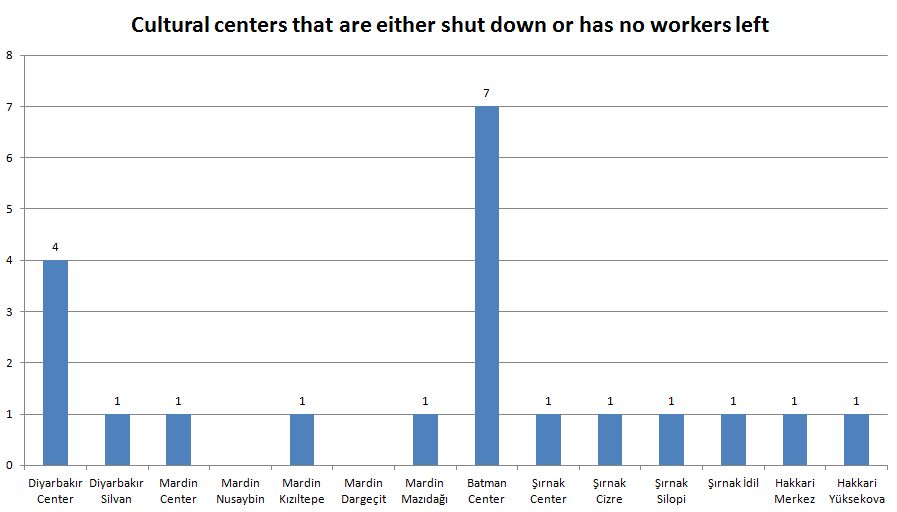
In the present case, whereby it is impossible to acquire official data, we gathered our data by way of extensive press scanning as well as meeting with artists and municipality employees who were fired.
As a result, under the state of emergency, in these 14 cities where more than 4 million and 730 thousand people live;
- 21 culture and art centers were directly closed or their entire workforce was fired, resulting in de facto closure.
- 288 artists, employees and educators lost their jobs.
- 3,366 students, who were receiving education at these centers were denied this opportunity.
- 21 festivals were cancelled.
- 220 events, such as biennials, exhibitions, workshops, film screenings and theatre plays were cancelled.
- 2 sculptures were removed.
Up until now, 12 culture and art centers have been closed in Kızıltepe, Dargeçit, Mazıdağı and Nusaybin provinces of Mardin, Silvan province of Diyarbakır, central Şırnak and its İdil, Silopi and Cizre provinces.
In central Hakkari and its Yüksekova province, there are no events despite the fact that there are culture and art centers.
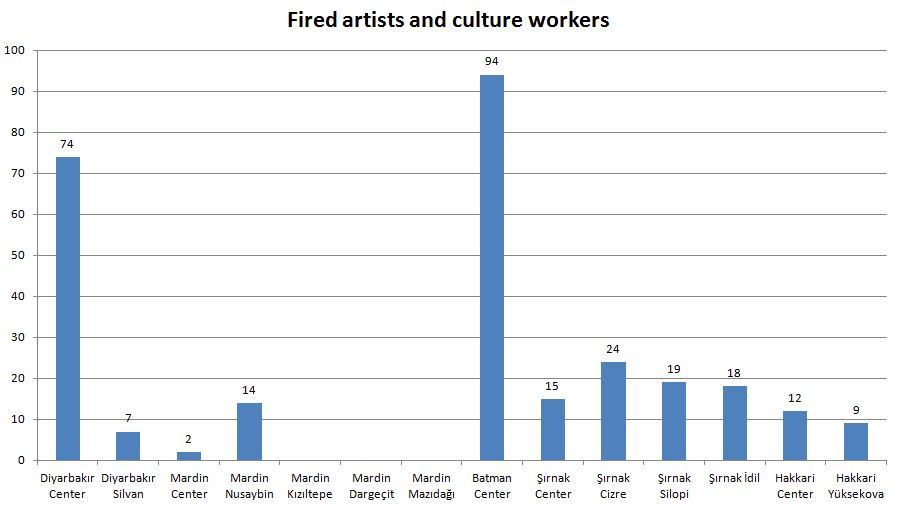
We met with artists from 14 cities and provinces who were suspended from their jobs in order to question the oppression in the culture and art fields. They stated that before the trustees were appointed, trainings were given in theatre, singing, cinema, folk dances, painting and
The artists also say that festivals and film days were organized in places associated with the municipalities, and that these types of festivals are no longer possible after the appointment of trustees.
We spoke about these developments with artists who were working in Diyarbakir and Mardin municipalities, where trustees were appointed to.
First, Mardin…
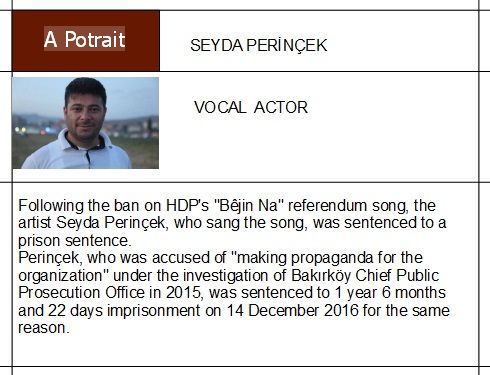
In Mardin, centers were closed and the department head was arrested
One of the cities devastated by the state of emergency and the preceding 2014-2015 era is Mardin. On November 16, 2016, Ahmet Türk and Februniye Akyol, Mardin Metropolitan Municipality Co-Mayors of Democratic Regions Party, were dismissed and Mardin Governor Mustafa Yaman was appointed as a trustee in their place. On November 24, 2016, Ahmet Türk was arrested. Although he was released on February 3, he could not go back to his position.
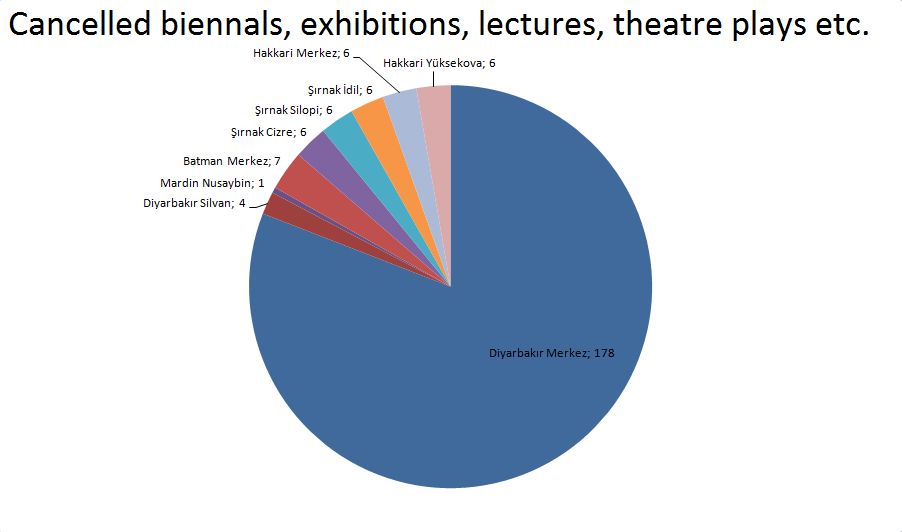
After the appointment of trustees, the activities of Nusaybin Mitani Culture and Arts Center, Kızıltepe Ali Temel Culture and Arts Center and Mazıdağı Çiyayê Mazi Culture and Arts Center were stopped.
Seyfettin Yavuz, Head of Cultural Services Department of Mardin Municipality, and Mehmet Ali Dal, branch manager of the same department, were suspended from their offices and were arrested and sent to Mardin E Type Closed Prison on December 12, 2016.
Çerçi Film Days, which was held in the city annually, was cancelled. Mardin International Theater Festival for Children and Youth, which was organized every November since 2009 was not conducted as the organizer, Dramatic Arts Education and Research Association (DRASED), was closed. Four months later, reopened with another decree issued on November 22, the association declared that they are going to organize the festival in November 2017.
Selamo: “Now is precisely the time for art”
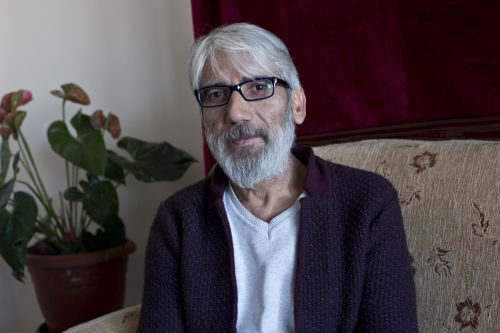
We spoke about the barriers to artistic production with director, producer and screenwriter Selamo, who has lived under curfew for months in his city.
Selamo sees the state of emergency as an opportunity for artists.
Selamo says that “now is precisely the time for art” and remarks that it is a “mistake” that artists have been working in institutions which are affiliated with state.
In order to finish with hopeful remarks regarding art under the shadow of trustees, we turn to Selamo:
“I am baffled by the fact that Kurdish artists see trustees as obstructions. Although being affiliated with municipalities has relieved artists economically, it has made us slowpokes.
In addition to becoming slowpokes, we had to run all our business in compliance with municipal regulations. Are we not those who say that “the state should not own artists”? Then, can we say “we will not produce art with the patronage of state” when we work in municipalities, which are state institutions? Even if we say so, we cannot fulfill it.
“I am baffled by the fact that our fellow artists are sitting, tied hand and foot, saying ‘the trustee came and hindered our art.’ Now is the time for producing art all together. You can form a commune and shoot a film, with someone’s camera, someone’s script and someone’s light. You can paint communally and form art communes. Then we can say that we are producing art.” (RT-ZD/NU/HK)
***
UNEMPLOYED JOURNALISTS CHASING NEWS
1- Even Though They Speak Through Their New “Occupations,” They Are Journalists
2- Journalism is Banned under theState of Emergency
3- Germany: New Generation Diaspora/Kopuntu
4- Germany: Immigration of the Suffocated
5- The Organization that Made "The Arab Girl Looks from the Window"
6- How They Work/Cannot Work, Breaking Down the Stereotypes
7- They Marry White People to Avoid Discrimination
8- Private Rehabilitation Centers and Problems: The Example of Bingöl
9- Two Directors Discuss the “Educational Support for People with Disabilities” Practices
10- Students and Parents from Bingöl Tell of Their Experiences
11- 'Solution is Inclusion System in Education for People with Disabilities'
12- The Neighborhood of "Giaour" Doesn't Exist Anymore
13- Mıgırdıç Margosyan Couldn't Recognize His Street Amidst Ruins
14- The Ones Who Choose Life, Love, and to Struggle, Just to Spite Hatred
15- Şahika: You Don’t Become A Trans Woman Later
16- Emirhan: It's Necessary to Have An Organized Struggle and to Record Our Experiences
17- Sarmaşık Association Was Closed; Where Does This Leave the Victims?
18- An Alternative Bank: The Sarmaşık Food Bank
19- Sarmaşık Association is Closed; “They Are Neither Hungry nor Full”
20- Balat: A Modern İstanbul Project in a Historical Setting
* The "Unemployed Journalists Chasing News" project is being realized with the financial support of Matra-Human Rights Program of Consulate General of the Kingdom of the Netherlands.






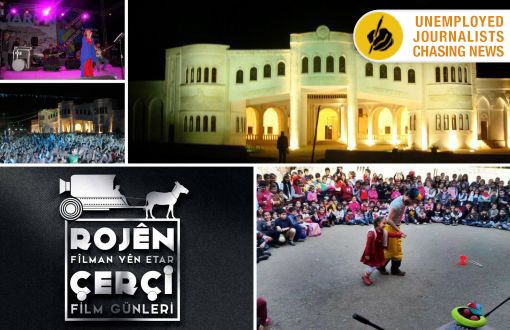
132.jpg)
